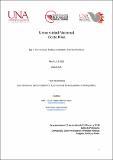| dc.contributor.advisor | Brenes Arce, Laura Catalina | |
| dc.contributor.author | Delgado Vargas, María Fernanda | |
| dc.date.accessioned | 2023-04-12T23:01:49Z | |
| dc.date.available | 2023-04-12T23:01:49Z | |
| dc.date.issued | 2022 | |
| dc.identifier.uri | http://hdl.handle.net/11056/25170 | |
| dc.description | Licenciatura en Sociología | es_ES |
| dc.description.abstract | Esta investigación busca adentrarse en situaciones de la forma en que se administra y ejerce el poder, que normalmente se da por sentado, que ocurre sin distinciones de género de quien lo posee. En ese sentido este trabajo se orienta a enfatizar la importancia de profundizar sobre las dinámicas sociales que se les emplea a las mujeres que representan puestos jerárquicos en el Poder Ejecutivo costarricense. La pertinencia de la investigación es de carácter internacional y nacional, la misma se plasma en los ámbitos normativos que inscriben acciones legales para la participación de las mujeres en puestos elegibles, no obstante, esta participación legal no va acompañada de un cambio estructural sociocultural, cuyo proceso de socialización debe de transgredir en la colectividad que va encauzada a la ruptura con la realidad intersubjetiva que se ha internalizado, el cual subyace en muchos ámbitos de lo social, pero es de interés visualizar particularmente en estas dinámicas sociales la obstaculización y desafío en el ejercicio de un cargo político de poder y decisión para estas que es una constante.
Empero de que en Costa Rica ya no concurren prohibiciones legales para estas ocupaciones, sí coexisten prácticas y conductas estereotipadas y descalificantes según la percepción de las vivencias de las participantes de esta investigación. Así, aquellas que logran acceder a cargos públicos altos lo ejercen en condiciones de desigualdad porque detentan un puesto que ha sido tradicionalmente pensado por y para la lógica masculina, demostrando el mantenimiento en la sociedad de un status quo. | es_ES |
| dc.description.abstract | This research seeks to delve into situations of the way in which power is administered and exercised, which is normally taken for granted, which occurs regardless of the gender of the person who possesses it. In this sense, this work is oriented to emphasize the importance of deepening the social dynamics that are used to women who represent hierarchical positions in the Costa Rican Executive Power. The relevance of the research is international and national, it is reflected in the regulatory areas that register legal actions for the participation of women in eligible positions, however, this legal participation is not accompanied by a sociocultural structural change, whose socialization process must transgress in the community that is channeled to break with the intersubjective reality that has been internalized, which underlies many areas of the social, but it is of interest to visualize particularly in these social dynamics the obstacle and challenge in the exercise of a political position of power and decision for these that is a constant. Despite the fact that in Costa Rica there are no longer legal prohibitions for these occupations, stereotyped and disqualifying practices and behaviors do coexist according to the perception of the experiences of the participants in this research. Thus, those who manage to gain access to high public positions exercise it in unequal conditions because they hold a position that has traditionally been thought by and for masculine logic, demonstrating the maintenance of a status quo in society. | es_ES |
| dc.description.sponsorship | Universidad Nacional, Costa Rica | es_ES |
| dc.language.iso | spa | es_ES |
| dc.publisher | Universidad Nacional, Costa Rica | es_ES |
| dc.rights | Acceso abierto | es_ES |
| dc.rights.uri | http://creativecommons.org/publicdomain/zero/1.0/ | * |
| dc.subject | MUJERES EN LA POLITICA | es_ES |
| dc.subject | PODER EJECUTIVO (COSTA RICA) | es_ES |
| dc.subject | PRESIDENTES | es_ES |
| dc.subject | PODER POLÍTICO | es_ES |
| dc.subject | MUJERES | es_ES |
| dc.subject | WOMEN IN POLITICS | es_ES |
| dc.subject | PRESIDENTS | es_ES |
| dc.subject | POLITICAL POWER | es_ES |
| dc.subject | EXECUTIVE POWER (COSTA RICA) | es_ES |
| dc.title | Dinámicas sociales en el ejercicio de poder político desde la percepción de mujeres en puestos de poder: el caso del Poder Ejecutivo del gobierno de Chinchilla-Miranda 2010-2014 | es_ES |
| dc.type | http://purl.org/coar/resource_type/c_7a1f | es_ES |
| dc.description.procedence | Escuela de Sociología | es_ES |


